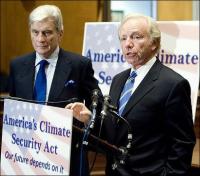Recently, a debate among environmental advocates over global warming strategy has spilled out into the public arena, apparently triggered by signals from Senator Barbara Boxer (D-Ca), chair of the Environment and Public Works Committee, that she will try to move a bill to address global warming this year.
(For more details, see this recent story in the LA Times.)
The bill in question, the bipartisan Lieberman-Warner Climate Security Act, would ratchet down U.S. emissions by something on the order of 70 percent by the year 2050.
This it would do by establishing a cap and trade program, one in which most of the initial allowances or pollution permits would be given for free to industry, although the percentage of giveaways would decline considerably over time.
For environmental groups like Greenpeace and Friends of the Earth, the problem with this legislation is at least twofold:
1) not even 70 percent reductions by 2050 will be enough to save the planet;
2) the emissions permits are gonna be worth a whole lot of money, meaning giving them away to polluters is a huge sloppy kiss to the people who caused the global warming problem in the first place. (Think ExxonMobil.)
So instead, groups like Friends of the Earth want to see stronger emissions cuts, on the order of 80 percent by 2050–which is what Hillary Clinton and Barack Obama are calling for–and they want a 100 percent public auction of the initial allowances, with the funds raised then used for a variety of investments in clean energy.
But for more compromise-oriented environmental groups like Environmental Defense, there’s a different calculus in play.
They want a workable bill that can pass Congress sooner rather than later, so that finally we set a price on carbon dioxide emissions and get out of the current tragedy of the commons situation, in which nobody pays to pollute the atmosphere. Moreover, they fear that an idealized 100 percent auction will outrage industry and lose its support for legislative action–and if industry goes, so do its congressional allies.
But here the debate takes another turn, because the environmentalists who don’t want to see anything happen this year seem to be banking on the idea that the U.S. Congress we’ll have in 2009–to say nothing of the new president–will be more inclined towards strong climate action. So why strive to pass a bill right now, in an election year?
Having considered all this, I have to say, I agree with bits from both camps. Let’s see:
- Who cares whether the bill we pass now cuts domestic emissions by 65 or 70 or 80 percent by 2050? The difference is not going to save the planet on its own, not when we also have to worry about what nations like India and China end up doing. Moreover, once we get a bill in place we will have literally four decades to strengthen it, even as we watch non-carbon energy sources proliferate and become cheaper.
- A 100 percent auction would be really, really nice. It is the right thing to do, without a doubt. But the people I’ve been talking to in Washington think this is just a nonstarter, and will continue to be one well past 2009. According to an analysis (PDF) by Friends of the Earth, the current Lieberman-Warner bill gives away 79 percent of the initial pollution permits at first, but gradually decreases that to 31 percent in 2050. Perhaps in 2009 we could get a bill that’s stronger, where the respective percentages have moved to, say, 60-40 giveaways versus auctioned permits. I don’t know. But I really question whether we can afford to hold out for 100-0.
- However, I do think the political “climate” will be better for a climate bill in 2009, especially in light of the way things are shaping up politically right now. We’re going to have a presidential race between John McCain and either Hillary Clinton or Barack Obama. Any of them would be better on global warming than George W. Bush; and any of them would be more likely to sign a serious climate bill into law. And as for changes in Congress–given the current momentum for global warming action, it is hard for me to see how we would get a new set of reps who are less inclined towards action than the current ones. In fact, congressional climate bad guy number one–Oklahoma Senator James Inhofe–may even be gone in 2009.
Where does all this lead? Well, it seems to me that a compromise position is possible, as long as you trust Senator Barbara Boxer and her Democratic colleagues in Congress.
After all, it sure looks to me like Boxer is testing the waters, to determine whether a strong bill can really pass this year. If it can’t, she’s said she won’t try it. If it can, she’s said she will.
And in light of the foregoing facts, isn’t that the best of both worlds?
By going forward this year and seeing what happens, Congressional Democrats will gain valuable political knowledge about how (or how not to) get a greenhouse gas bill passed–who will vote for it, who won’t, and what kind of compromises will be necessary to get legislation enacted. And, as long as they really won’t settle for something too weak, where’s the harm in that?
Then again, it all depends on whether you trust Congressional Democrats.
Subscribe to our newsletter
Stay up to date with DeSmog news and alerts






